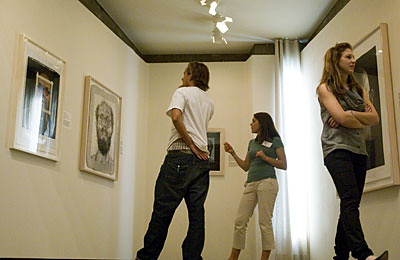Students, faculty, staff, and local community members gathered at Colgate’s Picker Art Gallery last week to celebrate the launch of a new exhibition, Chuck Close: Self-Portrait/Scribble/Etching Portfolio, 2000.
 |
| Colgate students view the pieces in the new Picker Art Gallery exhibition: Chuck Close: Self-Portrait/Scribble/Etching Portfolio, 2000. (Photo by Timothy D. Sofranko) |
They also heard print-making expert Bill Hall of Pace Editions, New York, describe the process by which Close’s visions were transferred from imagination to paper.
Pieces for the exhibition, initiated under the leadership of former gallery director Elizabeth Barker, came from the collection of Paul J. Schupf ’58.
“This project represents the most fun I’ve had during my 35 years in art,” he told reception attendees on Thursday.
Schupf’s passion for art in general and Close’s work in particular is being transferred to Colgate students, much like a printer’s plate transfers ink to waiting pages.
Between the festivities, undergraduates like Julia Heymans ’08 and Patrick Calabro ’08 toured the collection, experiencing the ground-breaking pieces on their own terms.
“If you were looking at the picture in a book, you wouldn’t see the texture that you can see here,” said Calabro. “And it gives me a level of interest I wouldn’t normally have had,” added Heymans.
|
More The exhibition runs through Nov. 4 at the Picker Art Gallery. It will then travel to the Mead Art Museum at Amherst University and the Colby College Museum of Art. Exhibition catalogs are available through the Colgate Bookstore. Colgate News • Get the latest stories sent by e-mail. |
Students and art enthusiasts in general can have their own learning experiences simply by walking through the exhibition between now and Nov. 4.
One v-shaped alcove features 12 individual color plate proofs that went into the creation of the show’s centerpiece and namesake, Self-Portrait/Scribble/Etching Portfolio, 2000.
As the viewer walks the line and peers closely at each subsequent portrait, Close’s face takes on new realism, depth, and dimension.
According to Hall, the master printer at Pace, the use of a dozen plates to form a single image represented an immense challenge for him and his colleagues.
“Chuck sets up interesting problems intentionally,” said Hall. Then, he draws others in to help him accomplish his goal.
Hall met with art and art history professor Lynn Schwarzer’s print-making class earlier in the day, giving them a sketch of the practical and artistic side of his profession.
“My students were able to talk and learn from someone who is passionate about the medium,” Schwarzer said. “We can have a level of conversation now that we couldn’t before Bill’s visit.”
By placing important works within arm’s reach and attracting the nation’s leading experts, loans from the Schupf collection add depth and breadth to art education at Colgate.
“It is wonderful to see the Picker alive in this way,” said university President Rebecca Chopp. “Today, we thank Paul Schupf, a man who teaches us all.”